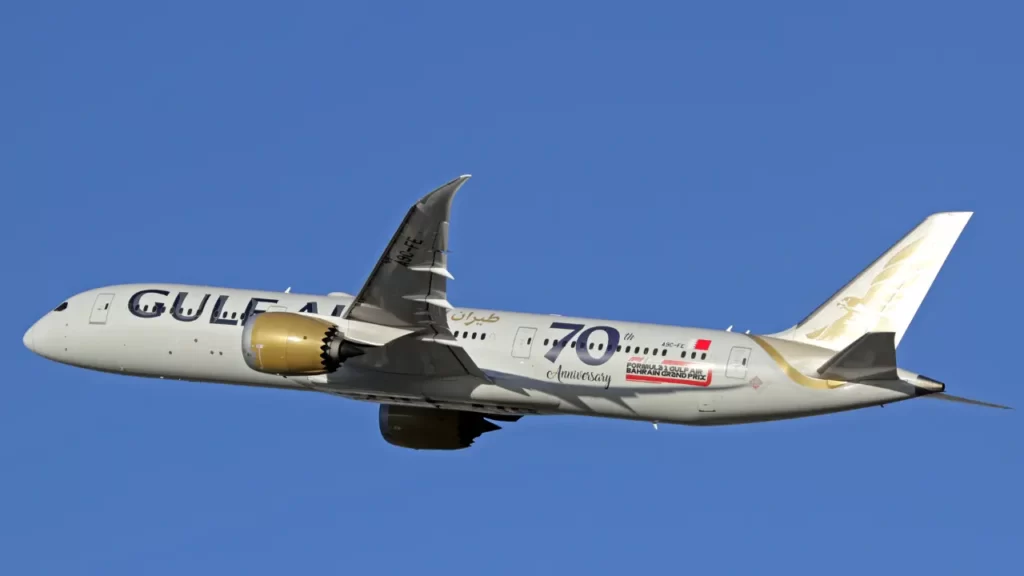
Gulf Air Overview
Gulf Air is the national carrier of the Kingdom of Bahrain, and it has a significant history as one of the oldest airlines in the Middle East. Here is an overview of Gulf Air:
Table of Contents
Founding and History:
Gulf Air was founded in 1950 as Gulf Aviation Company Limited. It started as a small private airline, initially serving routes within the Gulf region.
Establishment of Gulf Air (1974):
In 1974, Gulf Aviation underwent a major reorganization, and Gulf Air was established as the flag carrier of Bahrain, along with the governments of Oman, Qatar, and the United Arab Emirates as joint shareholders.
Hub and Bases:
Bahrain International Airport (BAH) serves as the primary hub for Gulf Air. The airline also has a network of bases and operates from other airports in the Gulf region.
Fleet:
Gulf Air operates a mixed fleet of modern aircraft, including narrow-body and wide-body airplanes. The fleet includes Airbus A320 family, Airbus A321neo, Airbus A330, and Boeing 787 Dreamliner.
Network:
Gulf Air connects Bahrain to various destinations in the Middle East, Asia, Europe, and Africa. The airline has historically been an important link between the Gulf region and the rest of the world.
Services and Classes:
Gulf Air offers different classes of service, including Economy Class, Falcon Gold (Business Class), and a premium class called Falcon Gold Class Suites on select aircraft. Passengers enjoy in-flight entertainment, meals, and other amenities.
Frequent Flyer Program:
Gulf Air operates a frequent flyer program called FalconFlyer. Members earn miles for flights and other eligible activities, and these miles can be redeemed for flight tickets, upgrades, and other benefits.
Codeshare Agreements:
Gulf Air has entered into codeshare agreements with various airlines, allowing passengers to connect seamlessly to a broader range of destinations. These partnerships enhance the airline’s global reach.
Modernization Efforts:
Gulf Air has undergone fleet modernization efforts, introducing fuel-efficient aircraft like the Boeing 787 Dreamliner and the Airbus A320neo to enhance operational efficiency and reduce environmental impact.
Strategic Initiatives:
Gulf Air has undertaken strategic initiatives to enhance its competitive position in the market, including route expansions, partnerships, and the introduction of new products and services.
Impact of COVID-19:
Like many other airlines, Gulf Air faced challenges due to the COVID-19 pandemic. The aviation industry experienced disruptions, including travel restrictions and a decline in passenger demand.
Gulf Air history

Gulf Air has a rich history that dates back to its founding in the 1950s. Here is an overview of key milestones in the history of Gulf Air:
Founding (1950):
Gulf Air traces its origins to the establishment of Gulf Aviation Company Limited in 1950. Initially, it was a private airline founded by British pilot Freddie Bosworth, serving routes within the Gulf region.
- Expansion and Becoming Gulf Air (1974):
In 1974, Gulf Aviation underwent a major transformation. The governments of Bahrain, Oman, Qatar, and the United Arab Emirates became joint shareholders, and Gulf Air was officially established as the flag carrier of Bahrain.
Fleet and Route Expansion:
Gulf Air expanded its fleet and route network, becoming a significant player in the Middle East aviation industry. The airline connected Bahrain with various destinations in the Gulf, Middle East, Asia, Europe, and Africa.
Introduction of Long-Haul Routes:
Gulf Air introduced long-haul routes, extending its reach to destinations outside the Gulf region. This move positioned Gulf Air as an international carrier serving a diverse range of destinations.
Fleet Modernization:
Over the years, Gulf Air has undergone fleet modernization efforts, introducing new and more fuel-efficient aircraft. The airline has operated various aircraft types, including Airbus and Boeing models.
Ownership Changes:
- Gulf Air has experienced changes in ownership structures over the years. While initially a joint venture among Gulf countries, ownership structures have evolved, with Bahrain becoming the sole owner of Gulf Air.
Codeshare Agreements and Alliances:
- Gulf Air has entered into codeshare agreements with various international airlines. The airline has also been a member of different airline alliances at different points in its history, including the Arab Air Carriers Organization.
Challenges and Restructuring:
- Gulf Air faced financial challenges and underwent restructuring processes at various times in its history. These initiatives were aimed at improving operational efficiency and financial sustainability.
Falcon Gold Class Suites and Premium Services:
- Gulf Air introduced premium services such as Falcon Gold Class Suites on select aircraft, providing enhanced comfort and amenities for premium passengers.
Fleet Renewal with Boeing 787 Dreamliner:
- Gulf Air embarked on a fleet renewal program, introducing modern and fuel-efficient aircraft like the Boeing 787 Dreamliner. The introduction of these aircraft aimed to enhance the passenger experience and operational efficiency.
Impact of Geopolitical Events:
- Gulf Air, like other carriers in the region, has been impacted by geopolitical events that have affected the aviation industry in the Middle East.
- Gulf Air has played a pivotal role in connecting Bahrain with the world and contributing to the development of air travel in the Gulf region. For the latest and most accurate information about Gulf Air, including its current status, routes, and recent developments, it is recommended to check the official Gulf Air website and other reputable sources.
